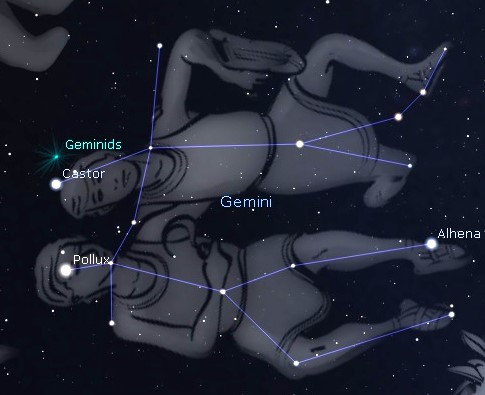This Week’s Sky at a Glance, 2023 Dec. 9 – Dec. 16
This Week’s Sky at a Glance, 2023 Dec. 9 – Dec. 16
The year’s best meteor shower radiates from near the star Castor in Gemini on Thursday, with that morning and Friday morning being the peak times. Under ideal conditions the Geminids can average two shooting stars per minute, but don’t expect to see anywhere near that number. With Gemini rising soon after an early sunset and riding high just after midnight, convenient evening viewing is rewarded more often than for the showers from Perseus and Leo, which rise much later on their peak nights. This year the Moon sets in evening twilight, giving a darker sky all night.
The Geminids are relatively slow and easier to catch with the eye, and they often have a golden glow. Dress very warmly, get comfortable in a reclining position, face an unobstructed patch of sky away from artificial lighting, and hope for a cloudless sky. Viewing on the days before and after could also be worthwhile if the weather forecast isn’t promising for the peak times.
The parent “comet” for the Geminids is actually the asteroid 3200 Phaethon, which was discovered in 1983. It orbits the Sun in a little more than 17 months, crossing the orbits of Mars, Earth, Venus and Mercury. At perihelion its temperature can exceed 600 C, which can cause its carbon-water material to break down and release the pebbles and dust particles that give us meteors when they burn up in our atmosphere.
This Week in the Solar System
Saturday’s sunrise in Moncton is at 7:49 and sunset will occur at 4:33, giving 8 hours, 44 minutes of daylight (7:51 and 4:41 in Saint John). Next Saturday the Sun will rise at 7:55 and set at 4:34, giving 8 hours, 39 minutes of daylight (7:57 and 4:42 in Saint John).
The Moon is near Venus this Saturday morning and it reaches the new moon phase on Tuesday. Mercury is stationary on Wednesday, setting about an hour after sunset. Saturn is best seen in the early evening and Jupiter is at its best around 9:30 pm. On Tuesday telescope users can watch its moon Ganymede enter Jupiter’s shadow at 8:00 and reappear at 9:42, at which time Europa will have begun to cross in front of the planet. Venus is slowly moving sunward but it will remain in the morning sky throughout the winter. The highlight of the week is the reliable Geminid meteor shower, which peaks on Thursday. With no moonlight to brighten the sky it should make braving the chill worthwhile that morning and evening and Friday morning.
The Fredericton Astronomy Club meets in the UNB Forestry-Earth Sciences building Tuesday at 7 pm. On Sunday evening at 8 pm, tune in to the Sunday Night Astronomy Show via the Facebook page or YouTube channel of Astronomy by the Bay.

